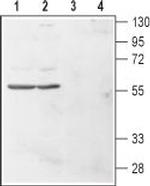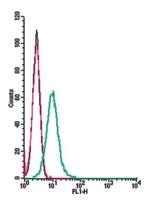Search Thermo Fisher Scientific
Alomone Labs, LTD
Histamine H4 Receptor (HRH4) (extracellular) Polyclonal Antibody
FIGURE: 1 / 2
Histamine H4 Receptor (HRH4) (extracellular) Antibody (AHR-004-200UL) in Flow


Product Details
AHR-004-200UL
Species Reactivity
Host/Isotype
Class
Type
Immunogen
Conjugate
Form
Concentration
Purification
Storage buffer
Contains
Storage conditions
Shipping conditions
Product Specific Information
Reconstitution: 25 µL, 50 µL or 0.2 mL double distilled water (DDW), depending on the sample size. The antibody ships as a lyophilized powder at room temperature. Upon arrival, it should be stored at -20C. The reconstituted solution can be stored at 4C for up to 1 week. For longer periods, small aliquots should be stored at -20C. Avoid multiple freezing and thawing. Centrifuge all antibody preparations before use (10000 x g 5 min).
Target Information
The Histamine H4 receptor has been reported in human blood peripheral leukocytes, bone marrow, colon, liver, lung, smalll intestine, spleen, testis, thymus, tonsil, and trachea. Contrary to the mouse H4 receptor, the human gene was not detected in brain. G-protein Coupled Receptors (GPCRs) comprise one of the largest families of signaling molecules with more thana thousandmembers currently predicted to exist. All GPCRs share a structural motif consisting of seven membrane-spanning helices, and exist in both active and inactive forms. An array of activating ligands participate in the conformation of GPCRs which leads to signaling via G-proteins and downstream effectors. Ongoing studies have also shown the vast series of reactions which participate in the negative regulation of GPCRs. This "turn-off" activity has tremendous implications for the physiological action of the cell, and continues to drive pharmacological research for new drug candidates. Twoblockbuster drugs which have been developed as GPCR-targetedpharmaceuticals are Zyprexa (Eli Lilly) and Claritin (Schering-Plough) which have multi-billion dollar shares of the mental health and allergy markets, respectively.
For Research Use Only. Not for use in diagnostic procedures. Not for resale without express authorization.
References (0)
Bioinformatics
Protein Aliases: AXOR35; G-protein coupled receptor 105; Gprc105; GPRv53; H4R; Histamine H4 receptor; histamine receptor; MGC130500; Pfi-013; SP9144
Gene Aliases: AXOR35; BG26; GPCR105; GPRv53; H4; H4R; HH4R; HRH4
UniProt ID: (Human) Q9H3N8
Entrez Gene ID: (Human) 59340

Performance Guarantee
If an Invitrogen™ antibody doesn't perform as described on our website or datasheet,we'll replace the product at no cost to you, or provide you with a credit for a future purchase.*
Learn more
We're here to help
Get expert recommendations for common problems or connect directly with an on staff expert for technical assistance related to applications, equipment and general product use.
Contact tech support
